If you’re considering becoming a professional fly fishing guide, you’re already headed in the right direction. Attending fly fishing guide schools is more than just an educational decision; it’s an investment in your future on the water. Whether you’ve been fishing for decades or are newer to the sport and passionate about helping others experience it, turning that passion into a rewarding outdoor career starts with a solid foundation.
With over 20 years of outfitting experience and four decades of guide knowledge, we’ve trained aspiring fly fishing guides from all over the country. Our fly fishing guide school is built around real-world skills, on-the-water instruction, and access to some of the most dynamic fisheries in the Rocky Mountain region. If you’re serious about stepping into the guiding profession, this is what we offer at RIGS Fly Shop and Guide Service in Ridgway, Colorado.
What is a Fly Fishing Guide School?
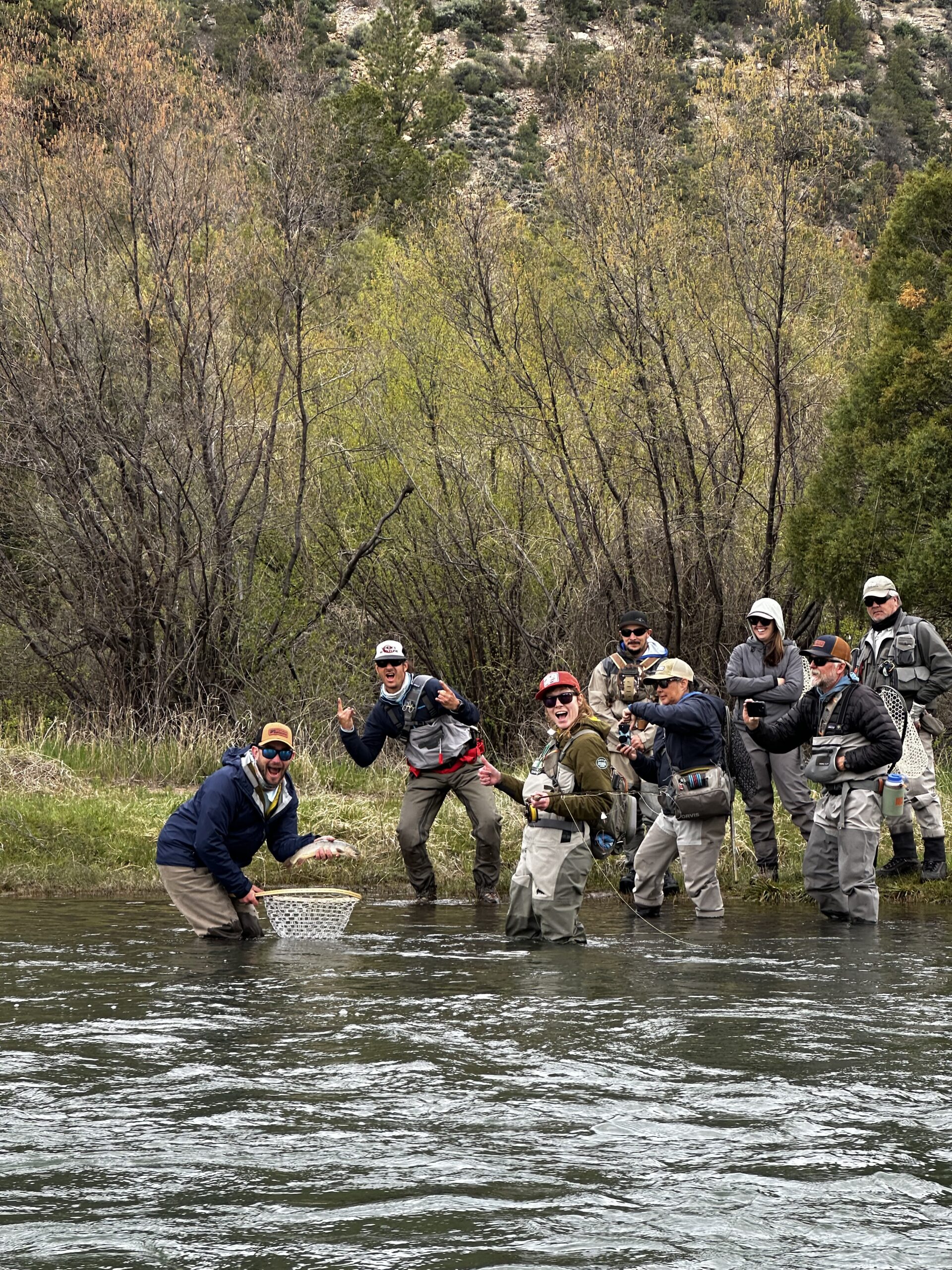
RIGS Walk Wade Guide School
A fly fishing guide school isn’t just another fly fishing class. It’s an immersive, skills-based training program that teaches you how to lead others safely, confidently, and professionally on the water. At RIGS, we don’t just show you how to catch fish. We teach you how to teach others. From casting instruction to knot systems, entomology to water safety, and everything in between.
What separates a strong guide from a good angler comes down to communication, adaptability, and decision-making. A professional fly fishing guide must read the water, interpret fish behavior, adjust to changing conditions, and keep clients safe. All while creating a positive and educational experience. Guiding is not just about catching fish. It is about adjusting your approach to each client and recognizing how to do that.
Our curriculum at RIGS Fly Shop blends both hard and soft skills. Guiding, like any skill, is a lifelong pursuit. As a teacher, you will learn more each year, and with every client interaction, gain new skills and begin mastering the mechanics of guiding. Our courses cover everything from fly selection and rigging systems to drift boat handling or wading logistics. Most importantly, you’ll walk away knowing how to coach a beginner through their first cast, manage people in a boat, and troubleshoot a tough bite day without losing your client’s trust.
In short, you’ll leave our program knowing how to guide, not just to fish.
Why Choose a Fly Fishing Guide School in Colorado?
Colorado is one of the best places in the country to train as a professional guide. The waters here are varied, challenging, and full of opportunities to develop advanced and adaptive skills that translate to guiding anywhere in the U.S. and beyond.
Colorado gives new guides the chance to learn in diverse and demanding environments, from technical tailwaters and freestone creeks to floatable canyons and alpine headwaters.
Why Ridgeway Is the Ideal Training Ground
RIGS Fly Shop is located in Ridgway, Colorado, right at the gateway to the San Juan Mountains and within striking distance of some of the state’s most iconic fisheries. Our students get direct access to waters like:
- The Uncompahgre River, known for its technical sight-fishing and finicky trout in cold tailwater flows.
- The San Miguel River, a freestone system that teaches adaptability in fast-moving conditions and pocket water.
- The Gunnison River offers world-class float fishing through remote canyon wilderness.
- A network of high-country creeks and alpine tributaries that help develop walk/wade instincts and small-water finesse.
RIGS is the only guide service in SW Colorado that operates with permits across all of these fisheries. That means our students don’t just talk theory in a classroom; they train on the same stretches of river where our professional guides are actively working.
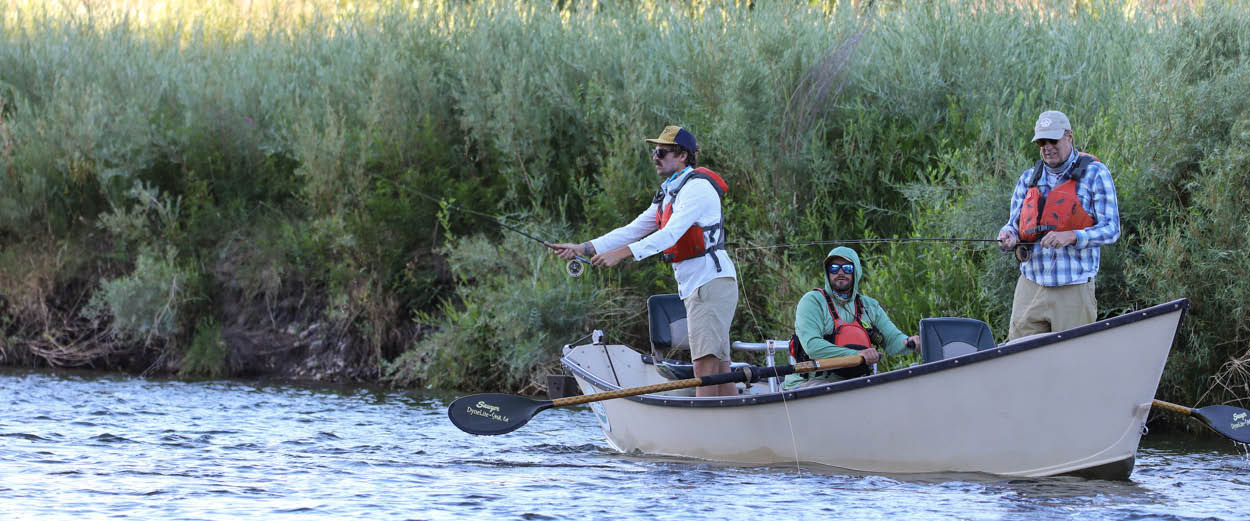
RIGS Float Fishing Guide School
What Makes RIGS Fly Fishing Guide School Different?
There are a few things that set us apart from other guide training programs, and we think they make a big difference when it comes to real-world preparedness.
1. We’re a Working Outfitter, Not Just a School
Our staff isn’t made up of part-time instructors or seasonal contract teachers. We are professional guides and outfitters with decades of experience running trips, managing logistics, and working with guests in real time. When we teach you, we’re not just pulling from a manual; we’re pulling from what we did last week on the water.
2. Two Specialized Programs to Match Your Goals
At RIGS, you can choose from two distinct guide school formats depending on your interests:
- The Float Fishing Guide School is ideal for those looking to guide from a raft or drift boat and earn your Colorado Raft Guide Certification, as well as the required 50 hours to start your journey as a professional float fishing guide. Most importantly, you’ll learn boat handling, safety protocols, casting from a moving platform, float fishing techniques, and how to guide multiple clients in variable conditions.
- The Walk/Wade Guide School focuses on foot-access guiding. You’ll work through navigation, trail and terrain management, backcountry safety, and client pacing and positioning in streams and rivers.
Each program teaches the essential guide skills needed for that format and helps you develop a teaching and leadership style that works in both controlled and unpredictable conditions.
3. Small Class Sizes, Maximum Hands-On Learning
We intentionally limit enrollment to ensure students receive direct feedback, meaningful practice time, and the chance to actively lead. You won’t just watch someone else guide. You’ll do it yourself, and we’ll coach you through every part of it.
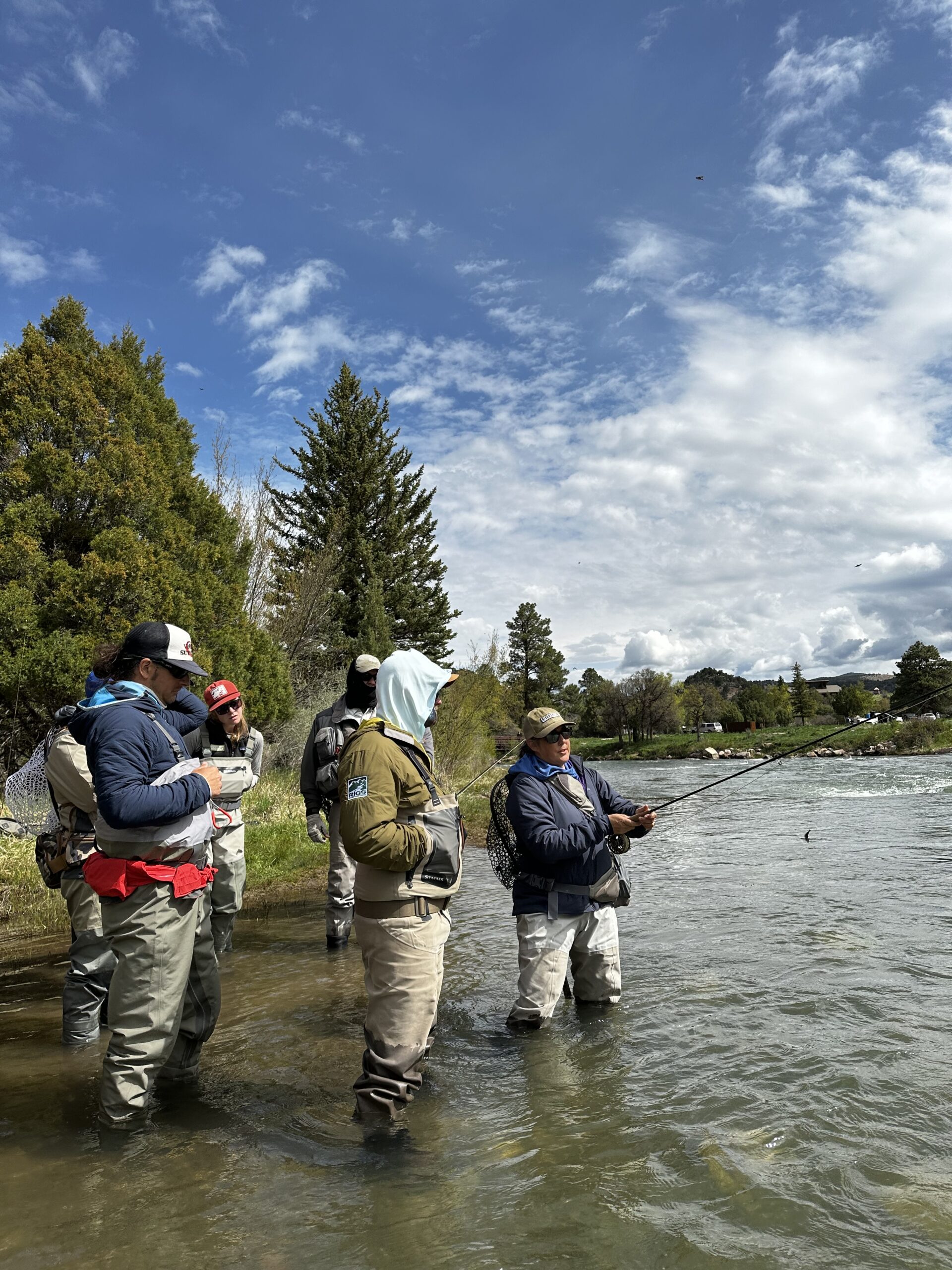
RIGS Walk Wade Guide School
What You’ll Learn at RIGS Guide School
From the first day of our program, you’ll be put into real-life guiding scenarios. We focus on preparing you to think and act like a professional from the moment you hit the water. Here’s what that looks like in practice:
Professional Guiding Fundamentals
You’ll learn how to set up a successful trip from start to finish. That includes pre-trip planning, risk management, and how to create clear expectations with clients before stepping into the river. We’ll also cover guide communication, instructional pacing, and how to read client skill levels quickly and adjust accordingly.
Technical Skills and On-the-Water Systems
From casting mechanics to knot tying systems, rigging multi-fly setups to selecting the right fly for different hatches, we’ll dive deep into the technical toolbox every guide needs. You’ll learn line management and fly presentation in different river conditions, and how to position yourself/your boat, and your client strategically to create the best opportunity for success.
For float students, you’ll also develop your rowing skills; reading water from the guide’s seat, setting up drifts, anchoring in current, and navigating obstacles safely with guests onboard.
Fish Behavior, Entomology, and Water Conditions
A good guide understands more than where fish live; they know when and why fish behave as they do. You’ll learn how temperature, light, oxygen levels, and hatches influence fish behavior. This allows you to explain what’s happening to your guests in a way that builds confidence and makes the experience more interactive.
Who is this Program for?
Our fly fishing guide school is designed for individuals who already have a passion for fly fishing and want more than just better casting skills. If you thrive in dynamic environments, enjoy helping others, and value time outside, this program is built with you in mind. If you are looking to lead, teach, and operate as a professional on the water, this course is your first step to becoming a fly fishing guide.
We work with students from all walks of life. Some arrive with years of fishing experience and are looking to formalize their knowledge and transition into a paid guiding role. Others are relatively new to fly fishing but have backgrounds in outdoor education, whitewater guiding, wilderness therapy, or wildlife biology, and bring a strong foundation in backcountry leadership and client care.
We’ve trained:
- Career changers leaving behind corporate roles in search of something more hands-on, meaningful, and aligned with their lifestyle.
- College graduates entering the outdoor industry, looking for a skillset that sets them apart in a competitive field.
- Experienced anglers ready to turn their passion into a profession.
- Multi-sport guides (rafting, hunting, climbing) who want to add fly fishing to their year-round service offerings.
- Educators and instructors interested in adding guided fishing trips to their programming or seasonal work.
You don’t need to be the most technical angler in the group. What matters more is that you’re coachable, willing to get uncomfortable in the name of growth, and committed to delivering great experiences for others.
If you’ve ever had a moment on the water that stuck with you and made you think, “I want to help someone else feel this”, you’re in the right place.
Daily Life at RIGS Guide School
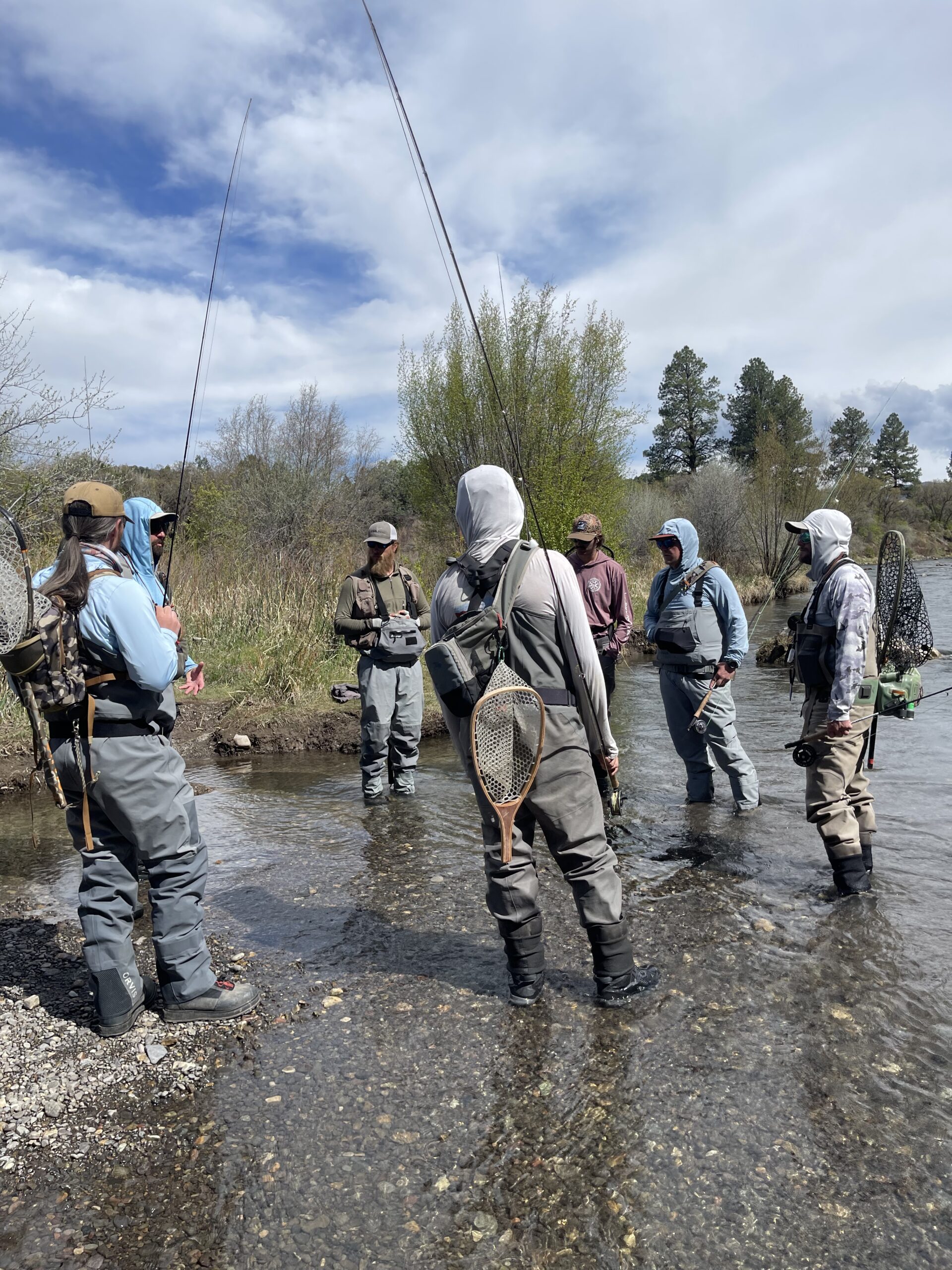
Walk Wade Guide School Group
Students often ask what a typical day at our guide school looks like. The short answer: it’s full, focused, and on the water as much as possible.
Each day starts with a morning briefing. We review the day’s objectives, go over relevant material, conditions, and run through the instructional focus. Then we head out. Our classroom is the river.
Mornings often include focused skills development, like running casting instruction drills, rigging for different river scenarios or navigating technical water features. Afternoons tend to be more scenario-based: guiding mock clients through different situations or responding to curveballs that get thrown your way. You’ll debrief at the end of each session, getting instructor feedback and often feedback from your peers as well. That peer-to-peer dynamic adds a lot to the experience. Everyone comes in with something to offer and something to work on.
In the evenings, students often head back into the shop for optional clinics, fly tying, knot sessions, or to swap stories and keep the learning going. We don’t just clock out when we leave the river. The guide lifestyle is immersive, and so is the training.
The RIGS Difference
Unlike some guide schools that operate on fixed sites or in a controlled environment, our setting changes daily. You’ll train on
different rivers, in different weather, with a rotating mix of variables that mimic the real world of guiding. Some days you’ll be rowing through rapids. Others, you’ll be tight-lining nymphs on a technical tailwater. That diversity is intentional and essential.
By the end of the week, you’ll have built a strong foundation and learned how to stay calm, adaptable, and effective in unpredictable situations. That’s what guiding is all about, and that’s the RIGS difference.
What You Need to Bring (And What We Provide)
Coming to guide school prepared not only helps you get the most out of the experience but also sets the tone for how you’ll present yourself as a professional in the field. While we supply the instructors and the materials you’ll need to train with, there are a few essentials every student should bring to stay comfortable, capable, and focused throughout the program.
You’ll need a 4 to 6-weight fly rod and reel, rigged with a floating line appropriate for the rod. If you’re enrolled in the float program, we recommend a slightly heavier setup, something that can handle streamers and indicator rigs from a boat. Waders and boots are a must, and they should fit properly. Breathable stockingfoot waders with a good belt and supportive wading boots (sticky rubber is preferred) will keep you safe and mobile. Also, bring a rain shell or waterproof jacket, sun protection, and polarized sunglasses; you’ll be outside all day, in all conditions.
A small waterproof pack or sling is helpful for keeping your personal items, snacks, nipper/forceps or extra layers are essential. We also recommend bringing a notebook or waterproof journal. Many students find value in jotting down insights, fly selections, knot sequences, or river observations during the course. A towel, change of clothes, or extra socks? Never a bad idea.
If you don’t have everything, don’t worry—we’re here to help. RIGS Fly Shop offers student discounts on gear purchases, and we can help you decide what makes sense based on your needs and future guiding goals.
What We Provide
As part of your enrollment, we supply all necessary course material and on-water teaching tools used during the course. We provide rafts and drift boats for the Float Fishing Guide School, including oars, anchor systems, safety kits, PFDs, and dry storage. You’ll be trained on the same gear our guides use in the field because that’s how we believe you should learn.
Our instructors will also share detailed gear recommendations based on their working setups, helping you identify what’s essential and what you can grow into over time. If you need something last minute or want to upgrade your kit, you’ll have full access to our retail team for guidance.
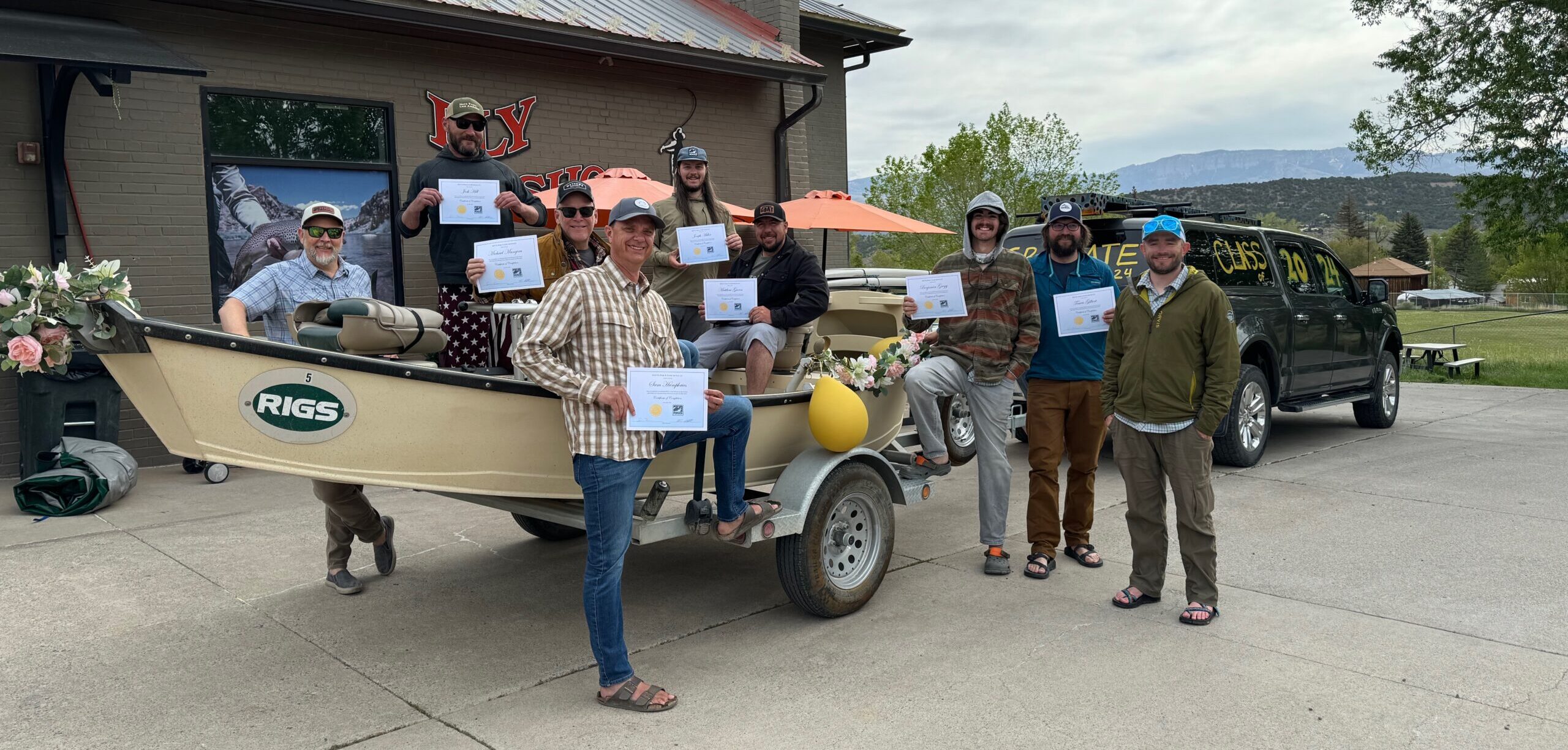
Float Fishing Guide School Graduation
What Happens After You Graduate?
Graduating from RIGS Fly Fishing Guide School gives you more than just a skillset; it gives you a community. Our alumni stay in touch, support one another through job searches, and often end up working together years after their first float or trail hike.
We provide guidance on preparing for your first guide interview, what questions to ask a prospective outfitter, and how to present your strengths even if you’re new to the profession. Our instructors are also happy to write references for top-performing students and help you connect with outfitters in Colorado and beyond.
If you plan to guide in Colorado, we’ll walk you through the state’s outfitter regulations, help you understand the relationship between guides and outfitters, and share what you need to know to work legally and professionally in a permitted setting. If your goal is to guide in another state or internationally, we can advise you on what to expect and how to transfer what you’ve learned to different fisheries and client cultures.
While there is never any guarantee you will be ready to join the RIGS team after our guide school, we’ve had our top graduates go on to join our team after graduation. Our graduates have also gone on to later guide in Alaska, Montana, Idaho, Argentina, and Chile. Others have built side careers guiding on weekends or in the summer. Some have used our training to become instructors at lodges, outdoor schools, and nonprofit education centers.
No matter where your next step after graduation takes you, your training here becomes a calling card. Outfitters know the difference between someone who just loves to fish and someone who’s been trained to guide.
Conservation and Ethical Guiding
At RIGS, we take conservation seriously. Being a guide means more than putting people on fish. It means being a steward of the resource, protecting the waters you work on, respecting wildlife, and modeling ethical behavior for clients who may be completely new to fly fishing.
That’s why conservation principles are woven throughout our training. We cover fish handling, proper catch-and-release techniques, how to recognize spawning redds, and how to reduce your footprint as a walk/wade or float guide. We also discuss how to navigate crowded rivers, practice good river etiquette, and maintain professionalism even when other users may not be doing the same.
Guides often serve as a client’s first exposure to responsible fishing. What you model matters. That’s why we emphasize integrity, respect for the fishery, and a long-term outlook in every part of our curriculum.
FAQs about RIGS Fly Fishing Guide School
We get a lot of great questions from prospective students, especially those preparing to shift into guiding for the first time. Below are some of the most frequently asked questions about our fly fishing guide schools, along with straight answers to help you make an informed decision.
How long is the program?
We offer two different formats depending on the type of guiding you’re pursuing:
- The Float Fishing Guide School is a seven-day intensive program designed for those interested in guiding from rafts or drift boats. It focuses heavily on boat safety, rowing skills, anchor management, and client positioning. Some existing rowing experience is required.
- The Walk/Wade Guide School runs for three days. It emphasizes technical wading approaches, large and small-stream strategies, and working closely with clients on foot.
Both formats are immersive and fast-paced. These aren’t casual workshops, so you’ll be in a professional training environment from day one.
Do I need to be from Colorado to attend?
Not at all. We train students from all over the country and occasionally internationally. Many of our participants travel in for the course and stay locally during the program. Ridgway is a hub for outdoor adventure, and there are plenty of affordable lodging options, including campgrounds, cabins, and nearby motels. We suggest starting your search with campsites at Ridgway State Park.
We’re happy to provide recommendations based on your budget and preferences. If you’re flying in, Montrose Regional Airport is the closest commercial airport (45 minutes north of Ridgway).
Do I need to be an expert angler before I enroll?
No. You don’t have to be an expert to succeed in this program, but you should be comfortable handling a fly rod, familiar with basic fly fishing concepts, and willing to learn quickly. We do expect students to come in with a solid foundation in fly fishing, including basic knots, casting, and fly fishing equipment. If joining our float fishing guide course, we recommend having previous boating experience with basic river safety and a solid foundation in the above skills.
If you’re unsure about your current skill level, call us. We’ll discuss your background and help you decide the right course for you, or if you should brush up first with a guided trip or a casting clinic.
Do I need to own a boat to take the float program?
Not at all. RIGS provides all boats, oars, safety gear, and river equipment for the Float Fishing Guide School. You’ll row and guide from professional setups with the same gear we use on our commercial trips.
If you’re considering purchasing your own raft or drift boat, this course is also a great way to learn what you like and what works best in different guiding situations before making that investment. We can also help you navigate that purchase with our recommended manufacturers.
Will I be qualified to guide after the course?
Yes, if you’re ready to step up. Our guide school gives you the training, knowledge, and on-the-water experience to work under a licensed outfitter, the model used in Colorado and many other western states.
Colorado law requires that all fly fishing guides work through an outfitter who holds the proper permits and insurance. After completing our program, you’ll be well-positioned to apply for guide positions, and we’ll help you understand the steps to meet any remaining requirements (such as CPR/First Aid certification, which is commonly required for employment).
Is this program good for seasonal or part-time guides?
Absolutely. Not everyone who enters our program is looking for a full-time guiding career. Many of our students are teachers, fire service professionals, raft guides, and outdoor educators who want to guide during the summer months or use fly fishing instruction to complement other seasonal work.
This program also benefits lodge staff, wilderness program instructors, and anyone looking to run fly fishing trips safely and professionally as part of a broader outdoor skillset.
Do you offer job placement?
While we don’t guarantee placement, we regularly recommend top students to trusted outfitters and hire from our own programs when guide openings become available.
We’ll also advise you on how to approach outfitters, how to build a professional guide resume, and what questions to ask when evaluating potential employers. We know what outfitters are looking for in a new hire, and we’ll help you stand out for the right reasons.
If you’re motivated, professional, and willing to work hard, your odds of landing a guiding job after our program are very strong.
Ready to Become a Fly Fishing Guide?
Whether your goal is to guide full-time, work seasonally, or simply deepen your fly fishing skills to teach others, RIGS Fly Fishing Guide School will get you there.
You’ll leave with real experience, the ability to lead confidently, and the knowledge you trained with one of the most respected outfitters in Colorado.
Spots in our courses fill quickly. Visit our Fly Fishing Guide School to view upcoming course dates and get signed up. You can also reach us at (970) 626-4460 or email reservations@fishrigs.com with any questions.
Your next chapter on the water starts here.
